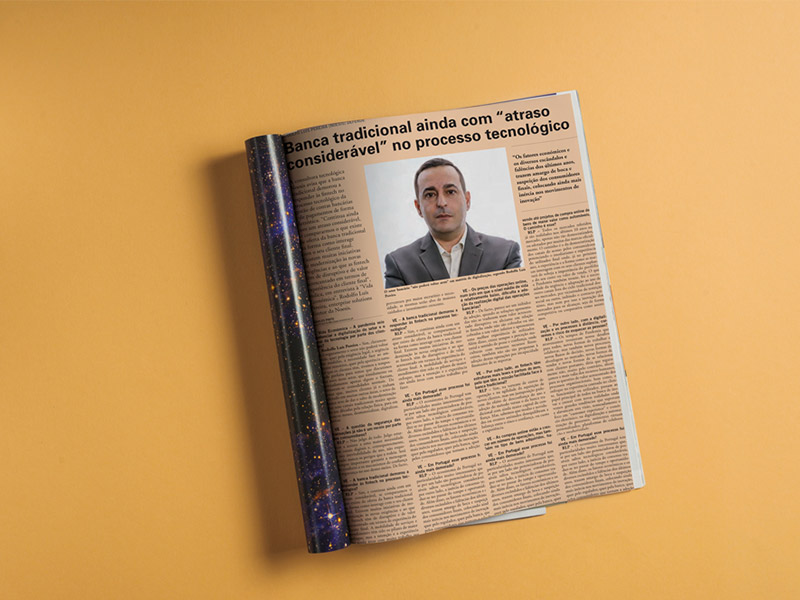
The technological consultant Noesis warns that traditional banking took too long to respond to fintech in the technological process of managing bank accounts and payments electronically. “It still remains with a considerable delay, if we compare the traditional banking offer in the way it interacts with its final customer. There are many modernization initiatives to the new requirements and to what fintechs have of disruptive and of added value in terms of the final customer experience ”, indicates, in an interview with“ Vida Económica ”, Rodolfo Luís Pereira, enterprise solutions director of Noesis.
Vida Económica - Has the pandemic boosted the digitalization of the sector and the use of technology by customers?
Rodolfo Luís Pereira - Yes, clearly and surely the sector cannot go back, either due to the legal requirement, the urgency of the measures, the needs presented in face of a restrictive environment, or the natural appetite that customers have, we had the perfect storm for topics we discussed years ago in this sector, which timidly or boldly only a few did. It should be noted that, many customers had already adopted it in many other areas, the banking sector had to take the leap in modernization of its traditional channels, much supported in decades by the physical relationship, in order to dematerialize, digitize, innovate, in a few months.
VE - Isn't the issue of transaction security a fear on the part of consumers?
RLP - I don't judge at all. I believe that we are seeing a greater need for digital channels and, consequently, their inevitable use, never forgetting the dangers that surround them. It will always be important to guarantee the message of comfort and the mechanisms of trust and security in the use of these means. In fact, perhaps due to greater scrutiny and need, they will be subject to greater care and increasing investment.
VE - Did traditional banking take too long to respond to fintech in the technological process?
RLP - Yes, and it still has a considerable delay, if we compare what is available in traditional banking in the way it interacts with its final customer. There are many modernization initiatives to the new requirements and to what the fintech have of disruptive and of added value in terms of the experience of the final customer. The mobility of services and attendance has been the main focus, but retention and experience are still areas with a lot of work to do.
VE - In Portugal, did this process take even longer?
RLP - The ecosystem of Portugal has very interesting particularities that, on the one hand, are potentiating possible considerable technological leaps, on the other hand, the inertia of the consensus translates into the passage of time and opportunity. In addition, the economic factors and the various scandals and bankruptcies of the last years, bring bitterness and suspicion to the final consumers, putting even more inertia in the innovation movements, either by the regulator, by the bank, or by the consumers that make the adoption complex and time consuming.
VE - The prices of online transactions, in a country where the average standard of living is relatively low, hinder the adoption of digital banking operations?
RLP - In fact, it seems to be an inhibitor of adoption, when the solutions presented do not translate into a disruptive or attractive added value in relation to fintechs where they are not charged or are charged at a lower value and present a better user experience. In addition, there is always a material perception and sense of ownership and trust, where cultures with lesser financial resources are also less likely to adopt these operations due to financial inability to support them.
VE - On the other hand, do fintechs have lighter structures and start from scratch, so their mission is made easier compared to traditional banking?
RLP - Yes, in terms of operating costs and the agility of acquiring new customers, but in juxtaposition they suffer from the distrust effect of using and adopting the method versus that of traditional banking with even greater trust capital. But, we know that fashions and novelties or anomalous events unbalance the balance between risk and trust, or cost and experience.
VE - Online shopping is growing in terms of the number of transactions, but also in the type of goods purchased, and there are even projects for the online purchase of higher value goods such as cars. Is this the way?
RLP - All the mentioned markets are already realities in the last 10 years on the market, just not so democratized, or officially adopted by many of the brands. The path is the democratization of access channels by consumers, enhancing the immediacy and experience of the end user where, already next year, the experience and the way brands interact with their customers will greatly surpass the importance of the portfolio and its cost or sales value. What this pandemic also brought was the need for urgency and adaptation to the use of other channels outside the traditional cycle of these markets, due to the vicissitudes of social or other restriction, inhibiting close contact, but not for that reason the innovation of the markets to reach them , either competitively or cooperatively as we see it.
VE - On the other hand, with digitalization and processes at a distance, are we at risk of forgetting people?
RLP - The pandemic times we are going through have brought new challenges for everyone, new ways of working and collaborating, but also new processes, new decision flows, new ways of approaching the market, new ways of selling and new ways of relating to customers therefore, I would say that certainly not, quite the contrary, we base the added value of human resources, for issues of added value of organizational processes, as well as, the focus on the experience centered on the customer, employee or user, pass to the main role of everyone in the search to innovate and grow with new realities where we see great trends that support and leverage this vision, namely the focus on "customer experience" and electronic commerce, in the digitization and automation of processes, personalized virtual assistants, collaboration and productivity platforms.
*Originally publish (in Portuguese) in Vida Económica



